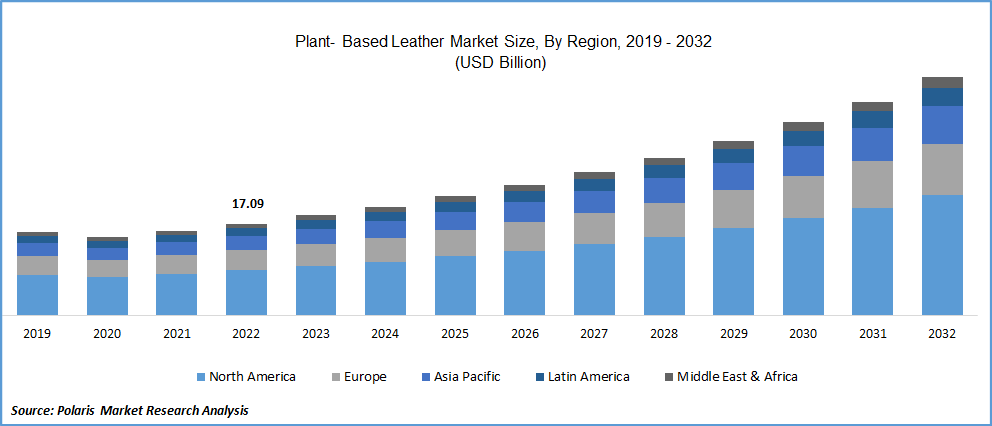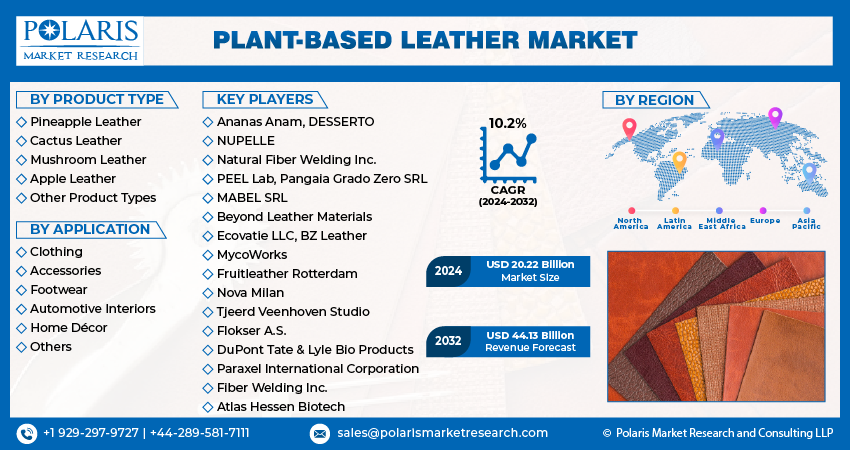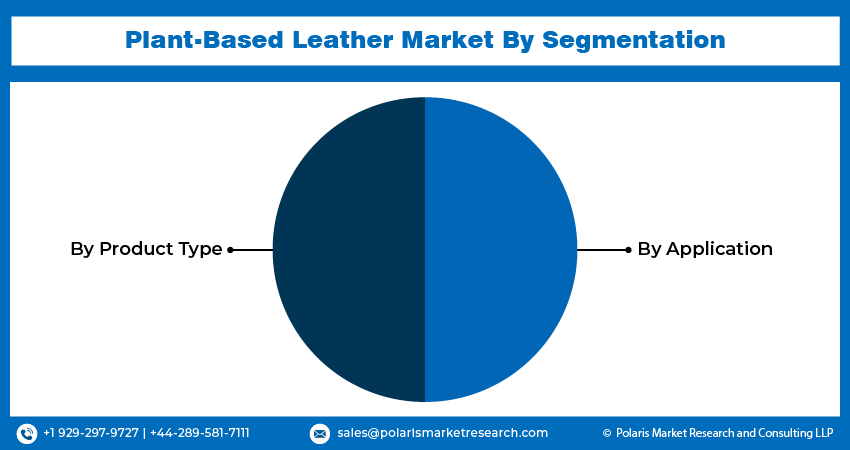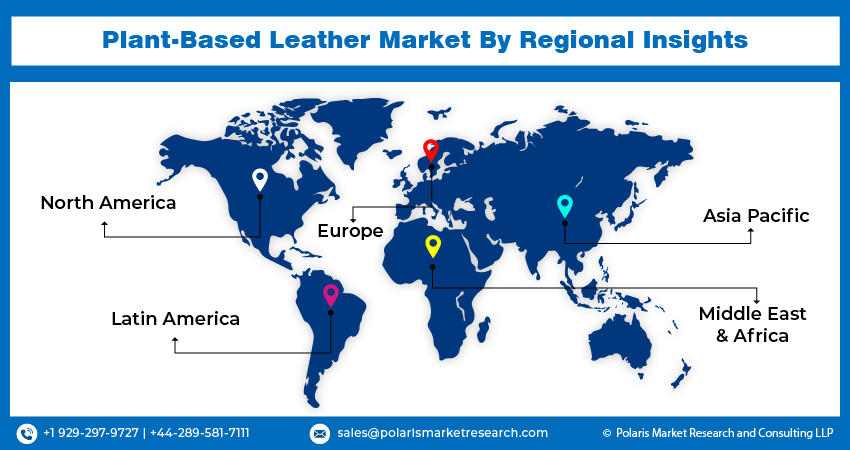
Plant-based Leather Market Share, Size, Trends, Industry Analysis Report, By Product Type (Pineapple Leather, Cactus Leather, Mushroom Leather, Apple Leather, and Other Product Types); By Application; By Region; Segment Forecast, 2024 - 2032
- Published Date:Jan-2024
- Pages: 115
- Format: PDF
- Report ID: PM3154
- Base Year: 2023
- Historical Data: 2019 - 2022
Report Outlook
The global plant-based leather market was valued at USD 18.58 Billion in 2023 and is expected to grow at a CAGR of 10.2% during the forecast period. The rapid increase in awareness towards the adoption of sustainable products among a large portion of the world’s population and increased usage of plant-based leathers in a variety of applications including door panels, rear self, seat coverings, clothes, sports bags, head rests, steering covers, furniture, and many others, that are the major factors expected to drive the global market growth. Furthermore, the extensive rise in research & development activities and broad environmental deterioration has piqued the curiosity to develop new improved plant-based products, and will further expand the global market in the coming years.
Plant-based leather, also referred to as eco-leather or vegan leather, is a type of material that’s made using plant materials. As an environment-friendly and cruelty-free alternative to traditional leather, plant-based leather can be made using a variety of plant materials. These materials can range from pineapple leaves and apple peels to corn and even mushrooms. Plant-based leather is used to manufacture a variety of products, including clothing, accessories, footwear, automotive interiors, and home décor.
The specific process for making plant-based leather is based on the type of material being used. However, it typically involves breaking down the plant fiber and then combining it with a binding agent. The end result of this process is a material that’s similar in appearance and texture to leather. One of the main benefits of plant-based leather is its environment-friendliness, which helps reduce waste and conserve resources. Also, the leather type has high durability and can just be as durable as animal leather. Furthermore, plant-based leather is water, stain, and UV-light resistant and doesn’t wear or crack easily. With changing consumer preferences toward environment-friendly and sustainable products, the plant-based leather market is projected to witness robust growth over the forecast period.

Know more about this report: Request for sample pages
For instance, in September 2022, Sarjaa, announced the launch of its latest eco-chic and versatile handbags, made of apple skin and many other fruit-based leather. The newly designed bags are exquisitely handcrafted using several fruit leathers including apple, pineapple, and cactus, in which the inner lining had ethically sourced silks and cotton.
Previously, leather was made mainly from animal skins, which are used by millions of animals annually and significantly affect biodiversity these types of leather are processed with many harmful chemicals, and a high amount of water is used in them, which also causes form water wastage. Whereas, plant-based leather does not need water to grow is completely biodegradable, and has a longer life of around 10 years, due to which, it is gaining high popularity and being adopted by a variety of end-user industries.
However, the development and production of plant-based leather requires high investment and also for receiving certifications from numerous organizations including USDA, PETA, and REACH, which in turn affect the overall price of the product. Since, the increased cost of products would hamper the adoption of plant-based leather products among middle-low income countries, which is likely to be the major restraining factor towards the market growth in the near future.
The outbreak of the COVID-19 pandemic has significantly impacted the growth of the plant-based leather market. The emergence of the deadly coronavirus has restricted the demand for a variety of fashion products, temporary closure of stores & malls, and high disruptions in the global supply chain, which has had a negative impact on plant-based leather demand. Moreover, the rapidly growing tensions of the virus have forced consumers to save their money for the future and avoid spending on fashion-related products, which resulted in an overall decline in sales during the pandemic period.
Industry Dynamics
Growth Drivers
Increasing environmental concerns such as climate change, global warming, and depletion of natural resources that result in changing consumer attitudes and spending behavior towards environmental-friendly and sustainable products, are increasing the demand for vegan and cruelty-free products, and in turn, boosting the global plant-based leather market growth at a rapid pace. Mainly, young people who are the key factors in combating climate change are highly demanding the replacement of animal-derived leather with plant-based. Furthermore, several campaigns related to animal rights and animal welfare have been recently introduced across various countries along with the growing trend of using plant-based fashion products, accessories, and footwear, among others are among the prominent factors influencing the global market growth.

Report Segmentation
The market is primarily segmented based on product type, application, and region.
|
By Product Type |
By Application |
By Region |
|
|
|
Know more about this report: Request for sample pages
Mushroom Leather segment accounted for the largest market share in 2022
The mushroom leather segment accounted for the largest market share in 2022 and is likely to retain its position over the study period. The growth of the segment market can be mainly attributed to the increased application of mushroom leather in wide range of industries including the fashion and automotive industry to meet the growing requirement for vegan and cruelty-free products across the globe. In recent years, mushroom-based leather has been mooted and gained popularity as a replacement for animal leathers, as this kind of leather has very little impact on the environment as compared to synthetic ones, thereby the demand and growth of the segment market is growing exponentially.
Moreover, the cactus leather segment is projected to grow at a substantial growth rate during the forecast period, which is mainly accelerated by increased consumer awareness regarding the environment and a rise in demand for organic products worldwide. In addition, changes in people's living standards and increased penetration of internet facilities have resulted in higher consumption of leather products and are likely to have a positive impact on the segment growth in the coming years.
Fashion accessories segment is anticipated to grow at the fastest growth rate during the forecast period
The fashion accessories segment is expected to grow fastest over the projected period owing to the change in consumer preferences towards vegan and cruelty-free products due to the increasing trend of sustainable fashion. In addition, a wide range of end-product manufacturers across the world are using plant-based leather for the production of numerous types of accessories including notably handbags, watch straps, belts, and many more, which is significantly fueling the growth of the market.
For instance, in January 2023, FOReT, a sustainable brand, introduced its collection of vegan leather jewelry for men including cuffs, wristbands, rings, bracelets, and wraps, suited for any type of occasion or as casual wear. The company has received the PETA-approved vegan certification for all of its new products.
The footwear segment led the industry market for plant-based leather in 2022 with a holding of significant market share. An extensive rise in the R&D investment related to footwear product development, rapid increase in technological advancements and modernization in the production process, and growing awareness related to the concerns associated with synthetic material footwear, are among the key factors influencing the market growth.

Europe region dominated the global market in 2022
The Europe region dominated the market for plant-based leather in 2022 and is expected to maintain its dominance throughout the anticipated period. Various types of measures are being adopted by manufacturers and producers in the region to tackle several problems including climate neutrality, material recycling, climate management, sustainable production practices, and upcycling resulting in higher adoption of plant-based leather across several end-user products. Numerous fashion businesses in the European region use the leftovers mainly from the harvest of apples, pineapples, mushrooms, and other fruits to make plant-based leathers, to be used efficiently in clothing, accessories, footwear, and other applications.
Furthermore, the Asia Pacific region is expected to emerge as a fastest growing region at a CAGR of 5.5% over the coming years, which is mainly driven by increased population, rate of urbanization, and continuously growing industrialization in countries like India and China. Economic growth in emerging countries of APAC region, greater applications in the furnishing and footwear sector along with the rising government efforts towards animal welfare are expected to offer lucrative growth opportunities to the regional market.

Competitive Insight
Some of the major players operating in the global market include Ananas Anam, DESSERTO, NUPELLE, Natural Fiber Welding Inc., PEEL Lab, Pangaia Grado Zero SRL, MABEL SRL, Beyond Leather Materials, Ecovatie LLC, BZ Leather, MycoWorks, Fruitleather Rotterdam, Nova Milan, Tjeerd Veenhoven Studio, Flokser A.S., DuPont Tate & Lyle Bio Products, Paraxel International Corporation, Fiber Welding Inc., and Atlas Hessen Biotech.
Recent Developments
- In February 2022, Road Angles, entered into a new fashion alliance with the Desserto limited-edition cactus leather, which is organic breathable, and completely cruelty-free. It is made with luxurious cactus leather in mysterious black and precious gold and is highly resilient in hot and humid conditions, reliable, and durable also.
- Furthermore, in October 2021, Adidas Boxing, announced the launch of its new boxing gloves named Tilt 250, which is made from sustainable cactus leather and features a newly registered design technology that is likely to completely revolutionize the boxing gloves. Also, the newly developed product is the world’s first sustainable and environment-friendly organic material made of Nopal cactus.
Plant-based Leather Market Report Scope
|
Report Attributes |
Details |
|
Market size value in 2024 |
USD 20.22 Billion |
|
Revenue Forecast in 2032 |
USD 44.13 Billion |
|
CAGR |
10.2% from 2024 – 2032 |
|
Base year |
2023 |
|
Historical data |
2019 – 2022 |
|
Forecast period |
2024 – 2032 |
|
Quantitative units |
Revenue in USD billion and CAGR from 2024 to 2032 |
|
Segments Covered |
By Product Type, By Application, By Region |
|
Regional scope |
North America, Europe, Asia Pacific, Latin America; Middle East & Africa |
|
Key Companies |
Ananas Anam, DESSERTO, NUPELLE, Natural Fiber Welding Inc., PEEL Lab, Pangaia Grado Zero SRL, MABEL SRL, Beyond Leather Materials, Ecovatie LLC, BZ Leather, MycoWorks, Fruitleather Rotterdam, Nova Milan, Tjeerd Veenhoven Studio, Flokser A.S., DuPont Tate & Lyle Bio Products, Paraxel International Corporation, Fiber Welding Inc., and Atlas Hessen Biotech. |
Uncover the dynamics of the plant-based leather sector in 2024 with detailed statistics on market share, size, and revenue growth rate meticulously curated by Polaris Market Research Industry Reports. This all-encompassing analysis extends to a forward-looking market forecast until 2032, complemented by a perceptive historical overview. Immerse yourself in the profound insights offered by this industry analysis through a complimentary PDF download of the sample report.
FAQ's
The global plant-based leather market size is expected to reach USD 44.13 million in 2032
Key players in the plant-based leather market are Ananas Anam, DESSERTO, NUPELLE, Natural Fiber Welding Inc., PEEL Lab, Pangaia Grado Zero SRL, MABEL SRL, Beyond Leather Materials, Ecovatie LLC, BZ Leather, MycoWorks.
Europe contribute notably towards the global plant-based leather market.
The global plant-based leather market expected to grow at a CAGR of 10.1% during the forecast period.
The plant-based leather market report covering key segments are product type, application, and region.
